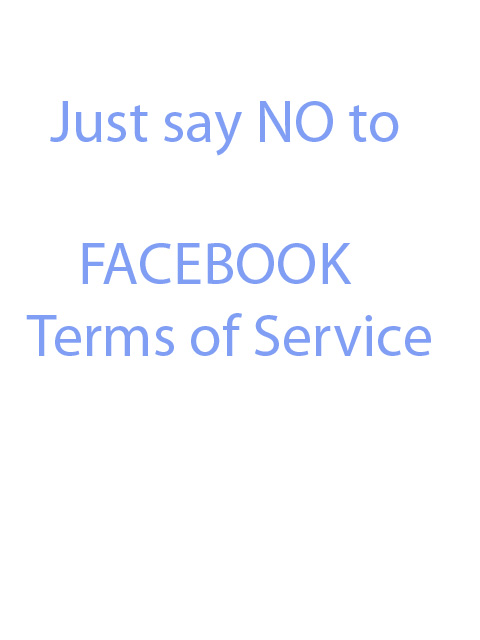Facebook’s new Terms of Service–Just Say NO!
Many of you have by now heard (perhaps through Twitter) that Facebook has changed their Terms of Service to essentially grant themselves in perpetuity rights to use your materials. Even if you delete the items, or cancel/delete your account.
While I have no problem with them using the material I make publicly available while I make it available I am incensed that they are now extending their claims, unilaterally and retroactively, to all my material for all time.
In protest, I have emailed Facebook and told them I reject their new TOS, I have deleted my photos, and changed my profile photo to a PROTEST, and hereby grant YOU, the reader, license to reuse this graphic as YOUR profile photo. All I ask is that you comment on here that you are using it.

As soon as I am home from work where I can log on to Facebook, that is becoming my profile picture.
It’s actually harsher than that. They are claiming more than rights (which allows for the creator to also claim rights to property in most cases). They are claiming a full license with little to know strictures. they can transfer it, re-sell it, or basically do anything they want with it to make money off of your content.
People need to realize how egregious this is and how it is a license to steal property and content. This is why I pay for server space for original works.
and by know i mean “no” ha.
I’m going to follow in your footsteps and if you don’t mind repost this on my blog.
Drew you seemed well versed in this.
If I post on my blog and is uploaded to FB through a “note” or feed can FB claim rights to it?
Pingback: Re-Post Facebook's new Terms of Service–Just Say NO! « The Long Road
Jeremy,
Good question. I think what happens there is that because you agree to the terms of their license, that license supersedes the license of the content if it is elsewhere. This is why they do have a clause about IP infringement above that.
“We respect the IP rights of others and we prohibit users from Posting User Content that violates another party’s IP rights. When we receive a proper claim of IP infringement, we promptly remove or disable access to the allegedly infringing User Content.”
However, if you are simply reposting your content from one place to FB, then since it is now in the medium of FB you have now in essence given license to FB to whatever the content was elsewhere, regardless of where it once was. For instance, if I take a picture with a digital camera, that image is first literally written in the hard media of the SD card or what have you. That is the first instance and that image is technically copyrighted first in that spot. If I then transfer that content to another place like FB, I am now transferring that content to another location, literally, and so I am in essence transferring the rights that pertain to the first instance by posting it to the location of the second instance.
That does not mean that I have given up my own rights to use that content for my own purposes since I have the original copy of it. But it also means that I have given FB license to use it as well even if the content on FB is identical to that which is on my SD card. So if FB goes to my blog or SD card and claims rights, they are technically infringing. But if they use that same content that is posted on their servers, they are techically not. But that’s something lawyers would have to argue in a court. My guess is that the ruling would be that by posting it on FB, you gave up your exclusive license.
On a final note, this is why master tapes with music are so guarded. It is also why demos that a band makes of a song are so important to keep under lock and key. The first instance and the individual tracks of a song are the first record of copyright just like an original work of art. A copy can be licensed anywhere, but the original is the jewel. It is just harder to establish that line of cause and effect with digital media since reproductions can be identical to originals. But digital signing, watermarks, DRM and so forth are ways that digital producers can protect original materials and something I recommend you learn how to do.